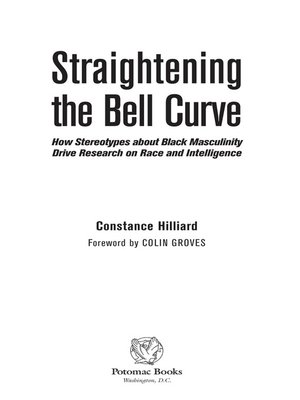Straightening the Bell Curve
ebook ∣ How Stereotypes about Black Masculinity Drive Research on Race and Intelligence
By Constance Hilliard

Sign up to save your library
With an OverDrive account, you can save your favorite libraries for at-a-glance information about availability. Find out more about OverDrive accounts.
Find this title in Libby, the library reading app by OverDrive.



Search for a digital library with this title
Title found at these libraries:
| Library Name | Distance |
|---|---|
| Loading... |
Finally, an answer to The Bell Curve
Straightening the Bell Curve offers a new way of looking at the distressingly persistent subject of intelligence research as it relates to race and gender. Constance Hilliards premiseùthat researchers preoccupied with proving racial hierarchies often sacrifice scientific truth to masculine insecuritiesrests on her examination of works of historical and contemporary figures in the field of racial research. Based on this thesis, Straightening the Bell Curve explores the emotional fixations concealed behind the presumably rational ones that propel otherwise clearheaded researchers to ignore elemental flaws in their conceptions as they set out to prove the cognitive inferiority of African Americans. The tendency to justify racial and cultural stereotypes on the grounds that they reflect underlying biological differences has a long and controversial history in America. As far back as the eighteenth century, new areas of scientific research employed craniology and craniometry in an attempt to ôdocumentö black inferiority. This scholarly preoccupation with measuring skull sizes emerged concomitant with two important developments: the solidifying of the trans-Atlantic slave trade and the deep-seated fear among Europeans that Africans possessed larger sexual organs than they. Thus, craniologists came to the rescue of their anxious male patrons, insisting that the price Africas oversexed savagesö paid for being well endowed was cognitive underdevelopment, confirmed through bogus skull measurement experiments. Constance HilliardÆs compelling argument aims to change forever the way American society sees research purporting to identify racial differences in cognition and will alter irrevocably the way we view individuals who insist on believing such pseudo-scientific conclusions. This book detonates a debate that will weaken the last barriers standing between Americas fractured racial past and its future promise.







